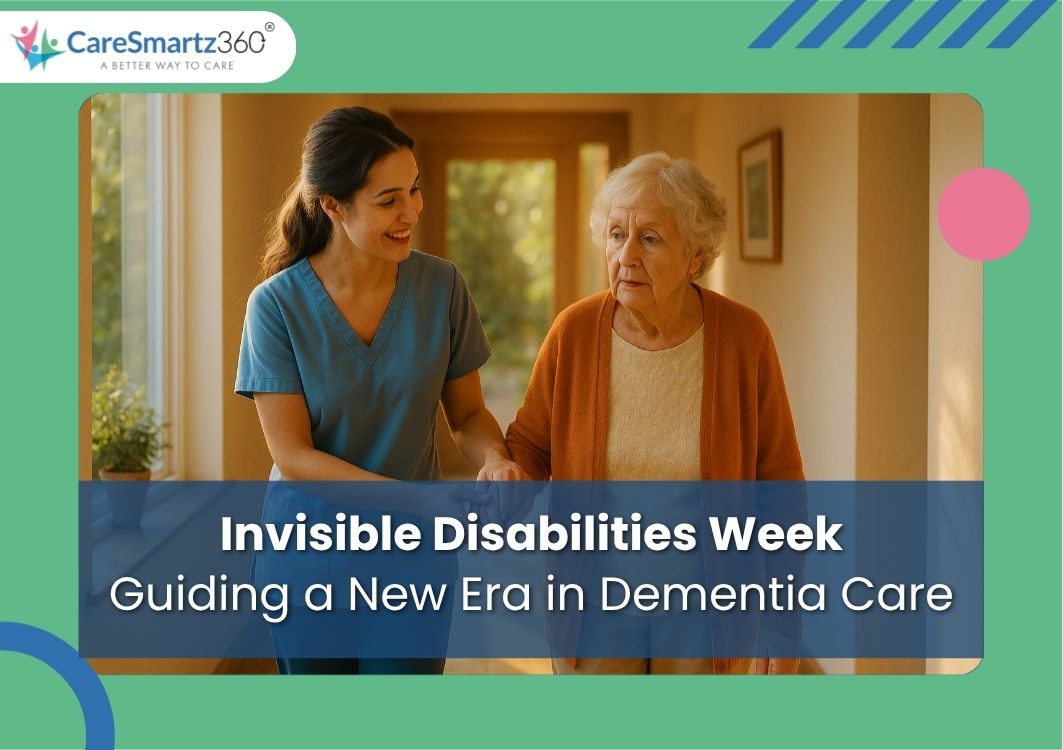Blog

This Invisible Disabilities Week, we shine a light on a condition often hidden in plain sight: dementia. Unlike a visible impairment, dementia’s impact unfolds in confusion, memory lapses & personality changes that others may not see.
Yet it is a profound invisible disability with serious consequences for quality of life. For millions of seniors and their caregivers, the challenges of dementia are very real and ever-present.
If you’re a home care agency owner or caregiver, you know how heart-wrenching and rewarding it can be to engage in dementia care. You also know how crucial it is to approach this work—not just as care and dementia management—but as a human-centered support system.
You also know how crucial it is to approach dementia care with empathy, patience, and the right knowledge.
Certain states feel this especially:
These families and caregivers shoulder a tremendous invisible burden, often without fanfare. How can we in the home care community better support them and the seniors they care for?
In this article, we’ll explore compassionate, practical strategies for dementia care at home – from fostering routines and communication, to tapping expert wisdom (see our expert quotes below), to leveraging innovative models like Medicare’s new GUIDE program. Read on!
Dementia is often called an “invisible disability” because its symptoms – memory loss, confusion, difficulty communicating – aren’t immediately apparent to the casual observer. A senior with dementia may look perfectly healthy, yet struggle internally with disorientation/anxiety.
This invisibility can lead to misunderstandings. For example, a person repeating questions or getting agitated in public may be seen as “difficult,” when in fact they are coping with a brain disorder. This is especially true when dealing with challenging behaviour in dementia—behaviors like agitation, sundowning, or wandering may be misinterpreted as mere stubbornness or defiance.
As caregivers, we must bridge that gap with empathy. Step into their world: recognize that what seems like a simple task (like getting dressed or recalling a word) can be overwhelming for someone with dementia.

By validating their feelings and providing gentle reassurance, we honor the person behind the disease.
Caregiver support is equally important. The invisible army of caregivers who support these seniors daily often sacrifice time, jobs, and sometimes their own health to keep loved ones safe at home.
It’s estimated that family & friends of people with dementia provided over 19 billion hours of unpaid care in 2024, valued at $413 billion. – Alzheimer’s Association
This often-unseen labor of love can take a toll—emotionally and physically. Home care agency owners and professional caregivers can make a big difference by acknowledging these challenges with dementia.
Ask family caregivers how they are doing, & involve them as partners in the care plan. Small acts, like sharing a tip that eased another client’s anxiety, or simply listening without judgment, validate the caregiver’s experience.
One of the best ways to reduce stress for a person with dementia is to create a familiar daily routine. Individuals with dementia thrive on consistency – seeing the same friendly faces, following the same morning schedule, eating meals at regular times.
A structured day provides a reassuring rhythm in a world that feels increasingly confusing. According to the Alzheimer’s Association, structured, pleasant activities can often reduce agitation and improve mood in those with dementia. Think about that: something as simple as a daily afternoon walk or a music playlist of old favorites can help avert frustration and brighten their day.
At the same time, flexibility is key. Dementia is progressive – abilities change from month to month, sometimes day to day. The care plan must be revisited often. Building in buffer time or optional rest periods helps reduce frustration.

Home care agencies can support this approach by enabling dynamic scheduling tools. For instance, AI-powered CareSmartz360 software allows last-minute shifts or respite visits, which helps maintain continuity of dementia care at home even as needs change.
Over time, you’ll learn the person’s natural patterns—maybe late mornings are calmer for conversations, or that evenings are when challenging behaviour in dementia (like sundowning) peaks. Your routine should adapt accordingly.
Communication is one of the biggest challenges – & opportunities – in dementia care. As language & memory deteriorate, we have to meet seniors where they are in conversation.
The golden rule is to keep it simple and positive. Use short sentences, speak slowly, and maintain a warm tone of voice. Even if the words don’t always register, your tone and body language speak volumes.
A smile, gentle eye contact, and calling the person by name can center their attention. Also, try to ask one question at a time, phrased as yes/no or either/or (“Would you like tea or juice?” is easier than open-ended questions). This reduces pressure on them to search for words.
Just as importantly, listen beyond words. A senior with dementia might not be able to express discomfort or fear verbally – but their body language or behavior will give clues. If your client is pacing or fidgeting, they might be anxious or need the toilet, even if they can’t articulate it.
By observing and gently asking or guiding (“Let’s try a bathroom break, then we’ll find your favorite sweater”), you can often address the need behind the behavior.
Another crucial tip: never argue or harshly correct someone with dementia. It’s a battle you can’t win – and it only causes distress. The Alzheimer’s Association advises caregivers: “Avoid arguing. If the person says something you don’t agree with, let it be.” This mantra can save you & your client a lot of distress.
One of the most exciting developments in dementia care is the launch of Medicare’s GUIDE Model – an acronym for Guiding an Improved Dementia Experience.
This is a nationwide pilot program (running 8 years, started in July 2024) aimed at elevating care for people with dementia and their caregivers. Why should home care providers care? Because GUIDE is essentially blueprinting what gold-standard dementia support should look like – much of it in home and community settings.
As of mid-2025, 330 organizations across the U.S. have signed on, from big academic medical centers to local community agencies & hospice groups. – AARP
It provides families with a care team and resources to navigate dementia.
By including respite, GUIDE acknowledges that supporting the caregiver’s health is part of caring for the patient.
As part of this discussion, we’ve gathered insights from several leading experts in dementia care:

Administrator, The Red Rose Home Care
“Dementia care isn’t about managing symptoms—it’s about responding with patience, empathy, & respect, every single time. Even if a story is told ten times, treat it like the first. That’s how dignity & trust are preserved.”

Uniper Ambassador
“Behind every diagnosis of dementia is a person still yearning to be understood & treated with dignity. While memories may fade, the capacity for love, empathy, & connection remains beautifully intact.
Routine & familiarity have become essential to my well-being. Because of my cognitive limitations, multitasking is extraordinarily difficult. I need to focus on just one thing at a time, and if my day becomes too crowded with activities or interactions, I quickly grow exhausted – both mentally and emotionally. That’s why having structure and control over what I do, and with whom I engage, is so important to me.
My ability to communicate is best when I have one-on-one conversations. In larger group settings, I can struggle to follow along and remember what is being said. During a conversation, within seconds, I can forget what I wanted to say – and even struggle to recall what the other person just said.
This lack of recall can be incredibly disorienting & frustrating. But when I can focus on a single person, with minimal distractions, I feel most connected and present.”

M.S., SLP, CDP
“As dementia progresses, individuals may lose the ability to initiate activities, communicate effectively, or navigate their environment confidently. Without structured, meaningful engagement, they are at higher risk for depression, anxiety, agitation, withdrawal, and rapid cognitive decline.
We have to identify and build on the communication strengths and skills the person still retains. Visual aids like picture boards, written key words, labeled items, or memory books can significantly enhance understanding and expression.
Using personal photos, music, or familiar objects can stimulate conversation and enhance emotional engagement, even if short-term memory is impaired.
Reducing background noise, maintaining eye contact, and using touch (when appropriate) can make communication clearer. Engagement requires tasks that the individual finds joy in as well as can participate in. If they enjoyed cooking meals but the task is too difficult, simplify it by involving them with washing vegetables and stirring ingredients.”

Positive Approach to Care® Trainer & Alzheimer’s Association Facilitator
“In dementia care, meeting people where they are—with empathy, validation, and understanding—changes everything. Training gives caregivers tools, but compassion gives those tools meaning.”

CEO/Founder, Memory Lane Foundation
“My top suggestion for the holidays is to focus on what you can actually enjoy. There’s no need to go all out or feel pressured to exceed expectations. Instead, create new traditions that work well with your current situation.
People with dementia can become easily overstimulated by large crowds or excessive noise, so it’s important to consider this when planning events. You might want to organize something with just your loved one or set up a quiet space they can retreat to, if things become overwhelming.
Remember, they don’t need to be involved in everything. If an event is a little too much, it’s okay not to include them. I also recommend keeping gatherings short, aiming for 30-60 minutes instead of extended hours. It’s about making the experience more manageable & enjoyable for everyone involved.”
As Invisible Disabilities Week reminds us, just because a condition isn’t immediately visible doesn’t mean it should remain in the shadows. Dementia may hide in plain sight, but together we can make its care a public priority – discussed openly with compassion and creativity.
Providing better care for seniors with dementia comes down to seeing the whole person & the whole caregiving circle. It’s about establishing comforting routines while being adaptable. It’s about communicating with love & patience when logic fails and arming caregivers with knowledge, respite, and the best tools technology can offer.
It’s also about embracing new ideas, like the GUIDE model’s vision of coordinated care, and advocating for policies and programs that support our families affected by dementia.
Most of all, it’s about empathy. When agency owners foster an empathetic culture in their home care business, that tone spreads – caregivers feel valued & model the same empathy with clients. Seniors sense that they are respected and safe, even as their world changes. Families feel heard and supported, rather than judged. This human connection is what truly makes a difference.
As you implement strategies from expert advice to smart software, never lose sight of the heart: honoring the dignity and uniqueness of the person with dementia.
